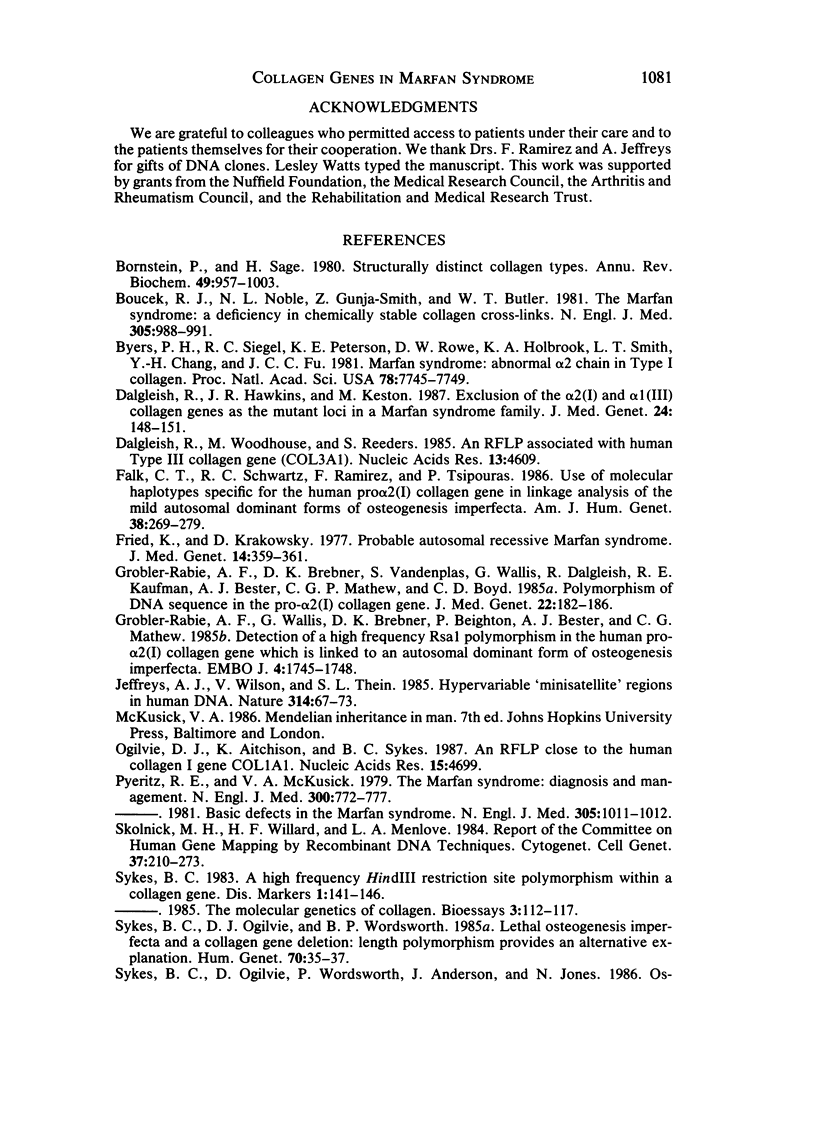Abstract
Linkage markers at or close to the genes encoding the three major fibrillar collagens were used to analyze the segregation of these loci in six pedigrees with dominantly inherited Marfan syndrome. Four pedigrees were discordant at one of the Type I collagen loci (COL1A2), and, of these, two were discordant at the other Type I locus (COL1A1). The Marfan syndrome also segregated independently of the structural loci for Type II and Type III collagen in these two families. This is evidence against the Marfan syndrome being, in general, due to mutations in the major fibrillar collagen genes.
Full text
PDF











Images in this article
Selected References
These references are in PubMed. This may not be the complete list of references from this article.
- Bornstein P., Sage H. Structurally distinct collagen types. Annu Rev Biochem. 1980;49:957–1003. doi: 10.1146/annurev.bi.49.070180.004521. [DOI] [PubMed] [Google Scholar]
- Boucek R. J., Noble N. L., Gunja-Smith Z., Butler W. T. The Marfan syndrome: a deficiency in chemically stable collagen cross-links. N Engl J Med. 1981 Oct 22;305(17):988–991. doi: 10.1056/NEJM198110223051705. [DOI] [PubMed] [Google Scholar]
- Byers P. H., Siegel R. C., Peterson K. E., Rowe D. W., Holbrook K. A., Smith L. T., Chang Y. H., Fu J. C. Marfan syndrome: abnormal alpha 2 chain in type I collagen. Proc Natl Acad Sci U S A. 1981 Dec;78(12):7745–7749. doi: 10.1073/pnas.78.12.7745. [DOI] [PMC free article] [PubMed] [Google Scholar]
- Dalgleish R., Hawkins J. R., Keston M. Exclusion of the alpha 2(I) and alpha 1(III) collagen genes as the mutant loci in a Marfan syndrome family. J Med Genet. 1987 Mar;24(3):148–151. doi: 10.1136/jmg.24.3.148. [DOI] [PMC free article] [PubMed] [Google Scholar]
- Dalgleish R., Woodhouse M., Reeders S. An RFLP associated with the human type III collagen gene (COL3A1). Nucleic Acids Res. 1985 Jun 25;13(12):4609–4609. doi: 10.1093/nar/13.12.4609. [DOI] [PMC free article] [PubMed] [Google Scholar]
- Falk C. T., Schwartz R. C., Ramirez F., Tsipouras P. Use of molecular haplotypes specific for the human pro alpha 2(I) collagen gene in linkage analysis of the mild autosomal dominant forms of osteogenesis imperfecta. Am J Hum Genet. 1986 Mar;38(3):269–279. [PMC free article] [PubMed] [Google Scholar]
- Fried K., Krakowsky D. Probable autosomal recessive Marfan syndrome. J Med Genet. 1977 Oct;14(5):359–361. doi: 10.1136/jmg.14.5.359. [DOI] [PMC free article] [PubMed] [Google Scholar]
- Grobler-Rabie A. F., Brebner D. K., Vandenplas S., Wallis G., Dalgleish R., Kaufman R. E., Bester A. J., Mathew C. G., Boyd C. D. Polymorphism of DNA sequence in the human pro alpha 2(I) collagen gene. J Med Genet. 1985 Jun;22(3):182–186. doi: 10.1136/jmg.22.3.182. [DOI] [PMC free article] [PubMed] [Google Scholar]
- Grobler-Rabie A. F., Wallis G., Brebner D. K., Beighton P., Bester A. J., Mathew C. G. Detection of a high frequency RsaI polymorphism in the human pro alpha 2(I) collagen gene which is linked to an autosomal dominant form of osteogenesis imperfecta. EMBO J. 1985 Jul;4(7):1745–1748. doi: 10.1002/j.1460-2075.1985.tb03845.x. [DOI] [PMC free article] [PubMed] [Google Scholar]
- Jeffreys A. J., Wilson V., Thein S. L. Hypervariable 'minisatellite' regions in human DNA. Nature. 1985 Mar 7;314(6006):67–73. doi: 10.1038/314067a0. [DOI] [PubMed] [Google Scholar]
- Ogilvie D. J., Aitchison K., Sykes B. C. An RFLP close to the human collagen I gene COL1A1. Nucleic Acids Res. 1987 Jun 11;15(11):4699–4699. doi: 10.1093/nar/15.11.4699. [DOI] [PMC free article] [PubMed] [Google Scholar]
- Pyeritz R. E., McKusick V. A. The Marfan syndrome: diagnosis and management. N Engl J Med. 1979 Apr 5;300(14):772–777. doi: 10.1056/NEJM197904053001406. [DOI] [PubMed] [Google Scholar]
- Skolnick M. H., Willard H. F., Menlove L. A. Report of the Committee on Human Gene Mapping by Recombinant DNA Techniques. Cytogenet Cell Genet. 1984;37(1-4):210–273. doi: 10.1159/000132011. [DOI] [PubMed] [Google Scholar]
- Sykes B. C., Ogilvie D. J., Wordsworth B. P. Lethal osteogenesis imperfecta and a collagen gene deletion. Length polymorphism provides an alternative explanation. Hum Genet. 1985;70(1):35–37. doi: 10.1007/BF00389455. [DOI] [PubMed] [Google Scholar]
- Sykes B., Ogilvie D., Wordsworth P., Anderson, Jones N. Osteogenesis imperfecta is linked to both type I collagen structural genes. Lancet. 1986 Jul 12;2(8498):69–72. doi: 10.1016/s0140-6736(86)91609-0. [DOI] [PubMed] [Google Scholar]
- Sykes B., Smith R., Vipond S., Paterson C., Cheah K., Solomon E. Exclusion of the alpha 1(II) cartilage collagen gene as the mutant locus in type IA osteogenesis imperfecta. J Med Genet. 1985 Jun;22(3):187–191. doi: 10.1136/jmg.22.3.187. [DOI] [PMC free article] [PubMed] [Google Scholar]
- Tsipouras P., Børresen A. L., Bamforth S., Harper P. S., Berg K. Marfan syndrome: exclusion of genetic linkage to the COL1A2 gene. Clin Genet. 1986 Nov;30(5):428–432. [PubMed] [Google Scholar]
- Tsipouras P., Myers J. C., Ramirez F., Prockop D. J. Restriction fragment length polymorphism associated with the pro alpha 2(I) gene of human type I procollagen. Application to a family with an autosomal dominant form of osteogenesis imperfecta. J Clin Invest. 1983 Oct;72(4):1262–1267. doi: 10.1172/JCI111082. [DOI] [PMC free article] [PubMed] [Google Scholar]
- Wallis G., Beighton P., Boyd C., Mathew C. G. Mutations linked to the pro alpha 2(I) collagen gene are responsible for several cases of osteogenesis imperfecta type I. J Med Genet. 1986 Oct;23(5):411–416. doi: 10.1136/jmg.23.5.411. [DOI] [PMC free article] [PubMed] [Google Scholar]




